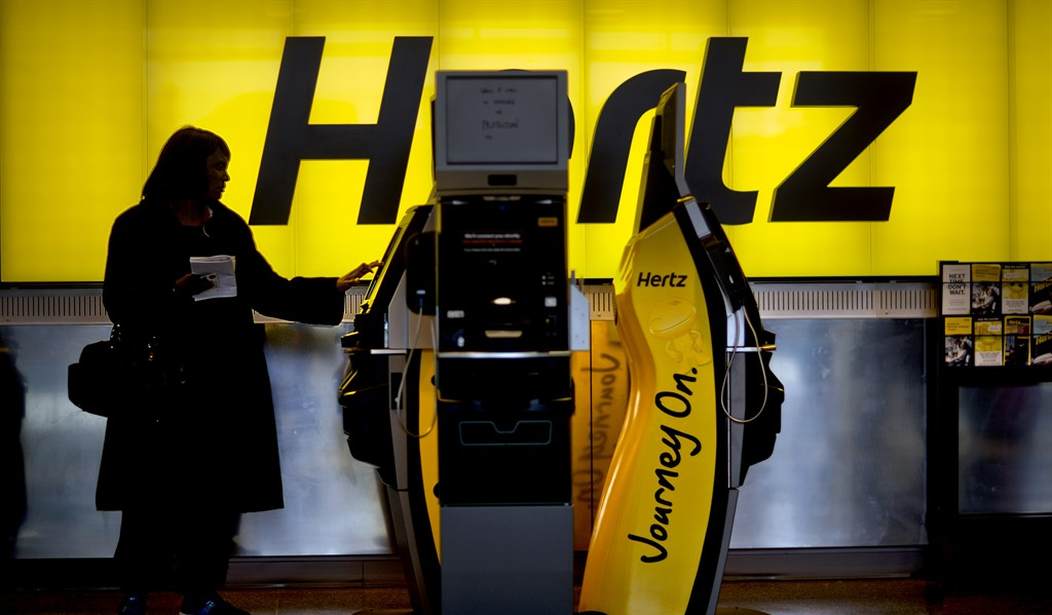Joe Biden’s dream of mandating a full conversion to electric vehicles on America’s roads is starting to go up in smoke. That process appears to have been accelerated by the arrival of one of the rougher winters North America has experienced in a while and the subsequent realization by the public that cars powered by massive batteries don’t perform very well in sub-freezing temperatures. This collapse in demand has hit auto manufacturers hard, with Ford already scaling back its production of EVs considerably. But it’s not just the manufacturers. Car rental agencies are taking it on the nose as well. Hertz dove into the EV market in a big way a few years ago, but now they’ve been forced to admit that their investments haven’t panned out. The Institute for Energy Research reports this week that Hertz will abandon much of its EV fleet, taking some steep losses in the process.
Hertz is cutting its losses in its adoption of electric vehicles and has decided to sell about 20,000 electric vehicles, one-third of its global fleet, and reinvest a portion of the proceeds in internal combustion engine vehicles. The sale is expected to cost the company about $245 million of net depreciation in addition to the depreciation expense Hertz will report in the fourth quarter of 2023. The change is due to the disappointing results that the car rental company reported last quarter…
The sale will include Teslas, Chevrolet Bolts, Volvos, many of which are already up for sale online — some at a steep discount. The car rental company made its EV announcement in 2021, with grand plans to help EVs go mainstream. It placed a $4.2 billion order for 100,000 Teslas–the largest ever single purchase of electric vehicles. But the auto market has changed dramatically in the years since, as early adopters of electric vehicles dried up, leaving consumers with skyrocketing interest rates and stuck with a few expensive models to choose from and virtually no used market as an alternative.
This conversion back to gas-powered vehicles is going to cost Hertz almost a quarter of a billion dollars. But they’ve learned quite a bit in the process. First of all, consumers aren’t just failing to purchase EVs in the anticipated numbers promised by the government. They don’t really want to rent them, either, particularly in cold weather or for longer trips. Cars that are left sitting in the lot while customers drive off in gas-powered vehicles don’t make the company any money.
Other problems have been exposed as well. Hertz determined that standard repairs to EVs also cost considerably more. They found that typical collision repairs “can often run about twice that of a comparable combustion engine vehicle.” Standard scheduled maintenance costs more for EVs as well. All of that adds up when you’re talking about a fleet of tens of thousands of vehicles.
Fortune Magazine is reporting that the growth of EV sales nearly ground to a halt by the end of 2023. They cite a variety of factors ranging from the high cost of EVs to performance issues and charging station availability. But another significant driver involves gas prices. When gas prices were initially soaring through the roof in the early part of the Biden administration, EVs probably seemed somewhat more of an economical choice for some consumers. But now, though they still remain well above Trump-era levels, gas prices have begun to come back down to something approaching normal levels. That further lessens the attraction of EVs by wiping out much of the anticipated savings the consumers had hoped to see over the life of the vehicle.
This has resulted in something of a backlog for EV manufacturers. It’s being reported that Ford sold fewer than 36,000 of its electric Mustang Mach E SUV models last year. The company was forced to delay one new EV battery plant, reduce the size of a second plant, and postpone $12 billion worth of future EV investments. Other manufacturers are making similar cutbacks.
The issues being experienced at Hertz should be sending up bright red warning flags to the federal government. If rental companies like Hertz are running into these issues with their fleet, rank-and-file consumers are seeing them with the EVs that they purchase for private use. People tend to resent government mandates in general. They get even more resentful if the mandate involves being forced to buy something that is more expensive and doesn’t perform as well as the more affordable options they have grown used to. Trying to convince them to do it anyway in the name of saving the climate is likely also becoming a tougher sell as frozen EVs are being towed away from nonfunctional charging stations. Perhaps it’s time to rethink these mandates and let the free market do its job based on the response of the consumers.








